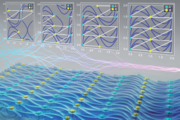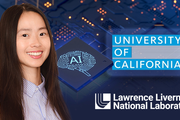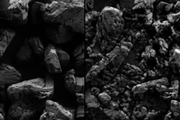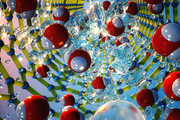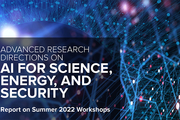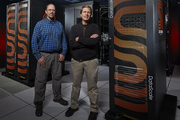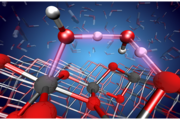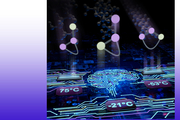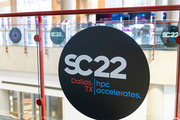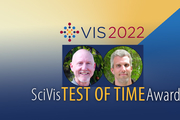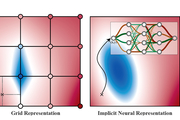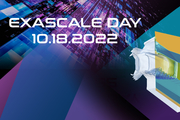Did you know we have a monthly newsletter? View past volumes and subscribe.
Will it bend? Reinforcement learning optimizes metamaterials
Dec. 13, 2023 -
Lawrence Livermore staff scientist Xiaoxing Xia collaborated with the Technical University of Denmark to integrate machine learning (ML) and 3D printing techniques. The effort naturally follows Xia’s PhD work in materials science at the California Institute of Technology, where he investigated electrochemically reconfigurable structures. In a paper published in the Journal of Materials...
Data Days brings DOE labs together for discussions on data management and more
Nov. 9, 2023 -
Data researchers, developers, data managers, and program managers from the DOE national laboratories visited LLNL on October 24–26 to discuss the latest in data management, sharing, and accessibility at the 2023 DOE Data Days (D3) workshop. Sponsored by the National Nuclear Security Administration’s (NNSA) Office of Defense Nuclear Nonproliferation and hosted annually by LLNL, the event...
LLNL, University of California partner for AI-driven additive manufacturing research
Sept. 27, 2023 -
Grace Gu, a faculty member in mechanical engineering at UC Berkeley, has been selected as the inaugural recipient of the LLNL Early Career UC Faculty Initiative. The initiative is a joint endeavor between LLNL’s Strategic Deterrence Principal Directorate and UC national laboratories at the University of California Office of the President, seeking to foster long-term academic partnerships and...
Making machine learning safer for biomedicine
Aug. 15, 2023 -
It’s hard to understate the impact machine learning will have on biomedicine. The ability to train computers to spot patterns by analyzing large, complex datasets is driving discoveries in heart disease, cancer, neurodegenerative diseases and more. For instance, Argonne National Laboratory (ANL) has used machine learning to aid cancer research and accelerate COVID-19 antiviral discovery. One...
Explainable artificial intelligence can enhance scientific workflows
July 25, 2023 -
As ML and AI tools become more widespread, a team of researchers in LLNL’s Computing and Physical and Life Sciences directorates are trying to provide a reasonable starting place for scientists who want to apply ML/AI, but don’t have the appropriate background. The team’s work grew out of a Laboratory Directed Research and Development project on feedstock materials optimization, which led to...
Machine learning reveals refreshing understanding of confined water
July 24, 2023 -
LLNL scientists combined large-scale molecular dynamics simulations with machine learning interatomic potentials derived from first-principles calculations to examine the hydrogen bonding of water confined in carbon nanotubes (CNTs). They found that the narrower the diameter of the CNT, the more the water structure is affected in a highly complex and nonlinear fashion. The research appears on...
Visionary report unveils ambitious roadmap to harness the power of AI in scientific discovery
June 12, 2023 -
A new report, the product of a series of workshops held in 2022 under the guidance of the U.S. Department of Energy’s Office of Science and the National Nuclear Security Administration, lays out a comprehensive vision for the Office of Science and NNSA to expand their work in scientific use of AI by building on existing strengths in world-leading high performance computing systems and data...
LLNL and SambaNova Systems announce additional AI hardware to support Lab’s cognitive simulation efforts
May 23, 2023 -
LLNL and SambaNova Systems have announced the addition of a spatial data flow accelerator into the Livermore Computing Center, part of an effort to upgrade the Lab’s CogSim program. LLNL will integrate the new hardware to further investigate CogSim approaches combining AI with high-performance computing—and how deep neural network hardware architectures can accelerate traditional physics...
Computing codes, simulations helped make ignition possible
April 6, 2023 -
Harkening back to the genesis of LLNL’s inertial confinement fusion (ICF) program, codes have played an essential role in simulating the complex physical processes that take place in an ICF target and the facets of each experiment that must be nearly perfect. Many of these processes are too complicated, expensive, or even impossible to predict through experiments alone. With only a few...
Fueling up hydrogen production
April 3, 2023 -
Through machine learning, an LLNL scientist has a better grasp of understanding materials used to produce hydrogen fuel. The interaction of water with TiO2 (titanium oxide) surfaces is especially important in various scientific fields and applications, from photocatalysis for hydrogen production to photooxidation of organic pollutants to self-cleaning surfaces and biomedical devices. However...
Scientists develop model for more efficient simulations of protein interactions linked to cancer
March 28, 2023 -
LLNL scientists have developed a theoretical model for more efficient molecular-level simulations of cell membranes and their lipid-protein interactions, part of a multi-institutional effort to better understand the behavior of cancer-causing membrane proteins. Developed under an ongoing collaboration by the Department of Energy and the National Cancer Institute (NCI) aimed at modeling cell...
From plasma to digital twins
March 13, 2023 -
LLNL's Nondestructive Evaluation (NDE) group has an array of techniques at its disposal for inspecting objects’ interiors without disturbing them: computed tomography, optical laser interferometry, and ultrasound, for example, can be used alone or in combination to gauge whether a component’s physical and material properties fall within allowed tolerances. In one project, the team of NDE...
New HPC4EI project to create 'digital twin' models for aerospace manufacturing
Jan. 19, 2023 -
A partnership involving LLNL aimed at developing “digital twins” for producing aerospace components is one of six new projects funded under the HPC for Energy Innovation (HPC4EI) initiative, the Department of Energy’s Office of Energy Efficiency and Renewable Energy announced. Sponsored by the HPC4Manufacturing (HPC4Mfg) Program, one of the pillars of HPC4EI, the collaboration between LLNL...
Supercomputing’s critical role in the fusion ignition breakthrough
Dec. 21, 2022 -
On December 5th, the research team at LLNL's National Ignition Facility (NIF) achieved a historic win in energy science: for the first time ever, more energy was produced by an artificial fusion reaction than was consumed—3.15 megajoules produced versus 2.05 megajoules in laser energy to cause the reaction. High-performance computing was key to this breakthrough (called ignition), and HPCwire...
ML model instantly predicts polymer properties
Nov. 30, 2022 -
Hundreds of millions of tons of polymer materials are produced globally for use in a vast and ever-growing application space with new material demands such as green chemistry polymers, consumer packaging, adhesives, automotive components, fabrics and solar cells. But discovering suitable polymer materials for use in these applications lies in accurately predicting the properties that a...
LLNL staff returns to Texas-sized Supercomputing Conference
Nov. 23, 2022 -
The 2022 International Conference for High Performance Computing, Networking, Storage, and Analysis (SC22) returned to Dallas as a large contingent of LLNL staff participated in sessions, panels, paper presentations, and workshops centered around HPC. The world’s largest conference of its kind celebrated its highest in-person attendance since the start of the COVID-19 pandemic, with about 11...
LLNL researchers win HPCwire award for applying cognitive simulation to ICF
Nov. 17, 2022 -
The high performance computing publication HPCwire announced LLNL as the winner of its Editor’s Choice award for Best Use of HPC in Energy for applying cognitive simulation (CogSim) methods to inertial confinement fusion (ICF) research. The award was presented at the largest supercomputing conference in the world: the 2022 International Conference for High Performance Computing, Networking...
Papers win Test of Time awards at 2022 IEEE VIS conference
Oct. 31, 2022 -
Two LLNL-led teams received SciVis Test of Time awards at the 2022 IEEE VIS conference on Oct. 18, for papers that have achieved lasting relevancy in the field of scientific visualization. Published in 2008, an LLNL-led paper that—for the first time—allowed Digital Morse Theory to be applied to large scale and three-dimensional data, won the 14-year Test of Time award for making a lasting...
Project co-led at LLNL looks to improve visualization of largescale datasets
Oct. 27, 2022 -
LLNL researchers are starting work on a three-year project aimed at improving methods for visual analysis of large heterogeneous data sets as part of a recent Department of Energy funding opportunity. The joint project, entitled “Neural Field Processing for Visual Analysis,” will be led at LLNL by co-principal investigator (PI) Andrew Gillette. Gillette is joined by lead PI Matthew Berger at...
LLNL scientists eagerly anticipate El Capitan’s potential impact
Oct. 18, 2022 -
While LLNL is eagerly awaiting the arrival of its first exascale-class supercomputer, El Capitan, physicists and computer scientists running scientific applications on testbeds for the machine are getting a taste of what to expect. “El Capitan has the potential of enabling more than 10x increase in problem throughput,” said Teresa Bailey, associate program director for computation physics in...

